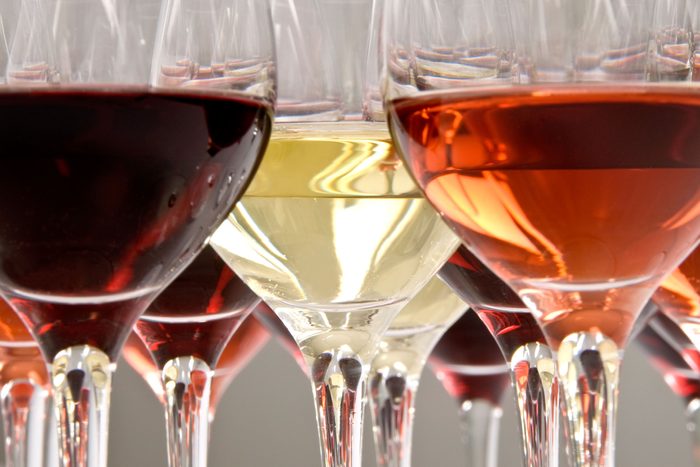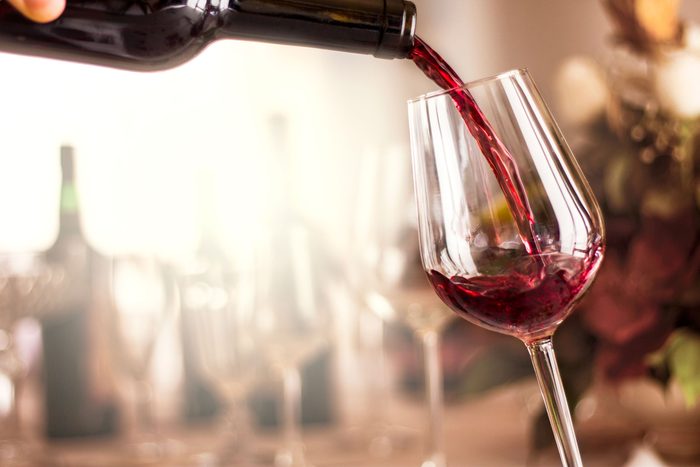Best wines for allergies, weight loss, and more
When it comes to choosing a wine, there are endless options, from reds to whites, to the regions they come from, like a Bordeaux from the Bordeaux region in France, or a Chianti from the Chianti region in Tuscany. It can be intimidating to go through the options at your local wine shop or restaurant, so how can you tell which one would be best for you and your health needs? If you have certain food allergies or sensitivities, it’s important to know which wines to opt for and which to avoid.
To effectively choose the type of wine that’s best for your lifestyle, check out these tips and tricks for finding a good glass of wine.

If you’re gluten free…
Those who have celiac disease have to really monitor each and every bite and sip, especially when something is prepared without their supervision, like at a restaurant or by a well-intentioned friend. This autoimmune disease is triggered by gluten, a substance found in wheat and other grains. Any intake of gluten can lead to serious intestinal damage, which, over time, can lead to malnutrition, anemia, osteoporosis, infertility, and many other health problems.
The good news is that wine is naturally gluten free. The bad news? “Gluten contamination can occur during the winemaking process,” says registered dietitian Tory Tedrow, who is based in Los Angeles. “Some winemakers line the aging barrels with flour or a wheat paste, or they use coloring or flavoring agents that may contain gluten.” Though being mindful is never a terrible idea, Tedrow says it would only be such a small amount that unless you have celiac disease, you’ll probably be OK to have a glass or two. (Some people can have a gluten sensitivity or intolerance that causes symptoms, like headaches or fatigue, but doesn’t result in intestinal damage.)
“Most people with gluten sensitivity can consume any type of wine without negative consequences,” she says. (You may be surprised to learn that these other foods have gluten.)
To play it safe, focus on companies that produce wines with few or no additives, suggests Kristin Kirkpatrick, a registered dietitian nutritionist and owner of KAK Consulting in Denver. “There are several on the market and typically will be free of all the components of wine that wellness experts don’t like to see, like sulfites and excess residual sugar. If you like a region, contact the winery and ask questions about how the wine is made. As with all food, getting as close to the source is always the best bet.” (Don’t miss these other reasons why your wine is giving you a headache.)

If you’re sensitive to certain ingredients…
Legumes make your stomach ache? Dairy definitely not your friend? (Check out these signs of lactose intolerance.) Similar to gluten, other ingredients might be added during the wine aging or prep process that could be problematic if your tummy is finicky.
“Some of the more commonly problematic ingredients include egg whites, chitosan (the covering of crustaceans), and casein (the main protein in milk),” says Tedrow. “Egg whites can be used to clarify red wines while casein is used to clarify whites.”
If you have an egg or milk allergy, avoid accordingly, she suggests. As for chitosan, it can be used as a finishing agent in white wines, but a study published in 2016 in the Annals of Allergy, Asthma, & Immunology suggests that wine processed with chitosan-based films as a preservative can be safely consumed by shrimp-allergic wine lovers. As for other shellfish allergies, it’s best to “stick with red,” suggests Tedrow. Also, learn more about natural wine and whether that is a safe option for your allergies.

If you’re watching your weight…
Regardless of whether you’re trying to lose weight or simply want to tone up and slim down, alcohol can easily throw a wrench in your goal-setting plans. That’s because alcohol’s star ingredient—sugar—can encourage fat storage. If you just can’t stick with any diet that doesn’t allow the occasional glass of wine, limit your consumption.
A review of studies published in 2015 in Current Obesity Reports suggests that light to moderate drinking—no more than two drinks a day for men, one for women—won’t raise your risk for obesity. Heavy drinking (more than four a day for men, more than three for women), on the other hand, will.
“Excess alcohol can make you eat more, contribute to the storage of belly fat, and impair sleep which can cause you to eat more and derail your diet the following day through confusion of digestive enzymes,” says Kirkpatrick. “I tell my patients to stick with American Heart Association’s drinking guidelines and to focus on foods with less sugar and fewer carbs. Wines with the least amount of carbs are the best—if consuming in moderation—and include pinot grigio, pinot noir, cabernet.”

If you’re training for a big race or big event…
In addition to the anxiety that builds before a big event—whether it’s running a marathon or walking down the aisle—your thirst for relieving said stress grows too. Unfortunately, it’s a double-whammy: Wine might help you relax and calm down, but it may also put a dent in your training schedule.
“Wine can always derail a good dietary plan,” says Kirkpatrick. “The excess calories and reduced inhibitions can all lead to weight gain, but a lack of sleep and a constant taxing of your detox organ, the liver, can impair performance and exercise adherence as well.”
Part of that has to do with the way wine can dehydrate your body, which will decrease performance. “While training, eliminate it,” suggests Kirkpatrick. “And if trying to lose weight, limit as much as possible, perhaps only allowing a few days per week.” (Here are simple tips to cut back on alcohol.)

If you’re easily hungover…
Blame it on your age, your size, or your inability to turn down another round of anything, but hangovers happen. However, if you’ve found yourself spending many a Sunday morning praying for your headache to go away, Tedrow says you might want to reevaluate what you’re drinking, how much, and the quality of your beverage. “If you’re easily hungover, you probably shouldn’t consume any alcohol or limit yourself to just a drink or two,” she says. “If you really want to drink, stick with white wine, as red wine contains congeners—a byproduct of fermentation that gives certain alcohols their deep colors (think brandy or red wine) and tend to heighten hangover symptoms.”
Need help? Here’s how to cure a hangover naturally.